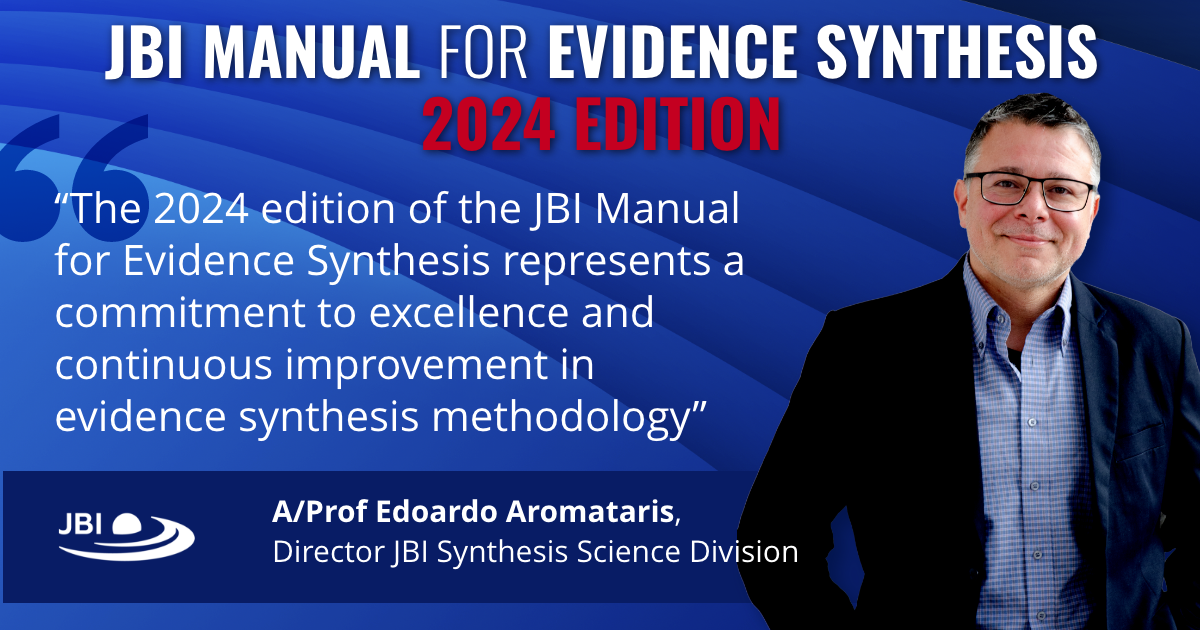
JBI updates methodological guidance
JBI is excited to launch the 2024 edition of the JBI Manual for Evidence Synthesis
The 2024 edition of the JBI Manual for Evidence Synthesis has a number of updates and new sections that will be forthcoming throughout the year. These changes reflect the latest methodological developments and feedback from end users, ensuring that researchers and authors have access to the most comprehensive and up-to-date guidance for conducting various types of evidence syntheses.
Major revisions
Separate sections provide world-leading methodology for different types of evidence synthesis (including Qualitative Systematic Reviews; Scoping Reviews; Umbrella Reviews, Textual Evidence Synthesis; and Mixed-Methods Reviews). All sections have undergone extensive revision and include a “What’s New?” segment highlighting the latest updates and additions, and a "Resources" segment at the end, providing links to additional publications, videos, and supplementary materials for further exploration.
Endorsement of external methodological guidance
In our commitment to working closely with groups and networks across the global evidence ecosystem to reduce duplication of effort, the JBI Scientific Committee has approved the removal of three chapters to adopt external methodological guidance for systematic reviews of prevalence and incidence, diagnostic test accuracy and measurement properties.
“If we are serious in our collective commitment to improve the global evidence ecosystem it is critical that we implement measures to prevent redundant work, optimise limited resources, and maximise opportunity to generate real innovation and impact. One simple step we can take immediately is to recognise where methodological strengths lie and eliminate unnecessary repetition” - JBI Executive Director, Prof Zoe Jordan
New sections
New sections will be added to the Manual, with the first offering methodological guidance on activities relevant to all syntheses, such as searching, languages other than English, knowledge user engagement, and addressing predatory publishing practices. The second new section provides an overview of the development and approvals process for content published in the Manual, enhancing transparency and understanding of the Manual's content and updates.

New information
New information has also been provided on Equity, Diversity, and Inclusion, Synthesis Prioritisation, and Living Evidence considerations, reflecting a commitment to addressing emerging topics and ensuring inclusivity in evidence synthesis.
“The 2024 edition of the JBI Manual for Evidence Synthesis represents a commitment to excellence and continuous improvement in evidence synthesis methodology”, said A/Prof Edoardo Aromataris, Director JBI Synthesis Science Division.
“With its updated content and user-friendly features, the JBI Manual of Evidence Synthesis equips researchers and authors with the tools and guidance needed to produce high-quality systematic reviews that contribute to evidence-based practice and decision-making across diverse disciplines and contexts.”
By incorporating the latest methodological developments and user feedback, the 2024 edition ensures that researchers and authors have access to a comprehensive and authoritative resource for conducting rigorous and transparent systematic reviews and scoping reviews.
More information and resources
Go to the 2024 edition of the JBI Manual for Evidence Synthesis
To learn more about the JBI Manual for Evidence Synthesis watch short video:
JBI methodology is underpinned by a unique approach to evidence-based healthcare: Decision-making that considers the feasibility, appropriateness, meaningfulness and effectiveness (FAME) of healthcare practices. Go to the JBI Model of Evidence-based Healthcare
See short video which gives an overview of the JBI Model of Evidence-based Healthcare: